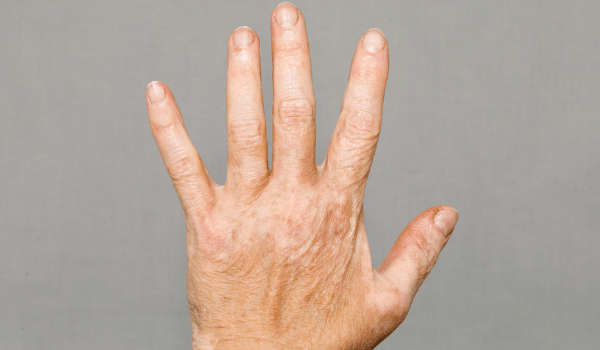If you or someone you know has vitiligo, you might be wondering about common questions related to vitiligo treatment, if vitiligo spreads, the triggers or causes surrounding it, and more. We’ll cover some common questions while focusing on the top vitiligo treatment options available.
What is Vitiligo?
Vitiligo is a skin condition that causes the skin to lose its natural color, leaving patches of skin that are lighter than the rest of the body. This condition not only affects the skin but can also cause people to lose color in their hair and eyes.
Vitiligo occurs when the cells in your body that produce melanin die or quit producing melanin (the pigment that produces your skin color, eye color, and the color of your hair). Once your cells die or decrease the amount of melanin being produced, your skin will begin to lighten in color and can eventually turn white.
There is no main cause of vitiligo. However, the appearance of vitiligo may be linked to one of the following:
- A family history of vitiligo
- A disorder that causes your immune system to attack the cells in your body that produce melanin
- An event that has triggered vitiligo symptoms such as a sunburn, stress, or exposure to industrial chemicals
Is Vitiligo Contagious?
Vitiligo is not a contagious skin condition. However, it can be emotionally distressing for the person with the condition, causing them to want to seek treatment fast.
Does Vitiligo Spread?
Vitiligo does not spread from person to person since it is not a contagious skin condition. However, it can spread on the body of the person who has vitiligo. Depending on the form of vitiligo that the patient has, it can sometimes spread fairly quickly.
How to Treat Vitiligo: Top 3 Options to Consider
While there are multiple treatments available for vitiligo symptoms and signs, the goal of most treatments is to slow the progression of the condition and to restore the loss of skin color. Some people lose only small patches of color while others lose the color over a large part of their skin.
Your dermatologist can work with you to choose which treatment option is best based on your preferences, overall health, and location of the affected skin. After speaking with your dermatologist, you may choose to not pursue treatment at all. Educate yourself on at least three different vitiligo treatments below so you can be prepared when discussing your options.
3 Vitiligo Treatment Options:
-
No Medical Treatment
Some people who have been diagnosed with vitiligo choose not to pursue treatment. Many people who choose to forgo treatment will cover the affected areas of skin with cosmetics from makeup to self-tanner. The option of forgoing medical treatment and using cosmetics instead is safe for all ages, with little to no side effects.
-
Topical Medications
Topical medications, which can be prescribed by your dermatologist, can be applied to small areas of your skin affected by vitiligo to help slow progression of color loss and restore pigment to your skin. It’s important to know that results are not immediate. However, with continued use, approximately half of people who use topical medications to treat their vitiligo regain some color in the affected areas. Topical medications can be combined with other medications to enhance the effects of the topical application. Topical medications are best used to treat vitiligo in patients with darker skin tones and on certain areas such as the face.
-
Light Treatment
Light therapy to treat vitiligo consists of two options: a narrowband ultraviolet B light box or excimer laser treatment. A light box is used when treating widespread vitiligo. Excimer laser treatments are used to treat small areas of affected skin. Approximately 70% of people who receive light treatment see color return to affected areas of their skin. Light treatment can be combined with a topical medications as a treatment regimen.
Can Vitiligo Be Cured Permanently?
Unfortunately, vitiligo cannot currently be cured permanently with treatment, although researchers are currently searching for a cure. Vitiligo treatment results may fade over time, so patients often return for routine treatment to keep their results.
No matter which treatment option you’re interested in learning more about, Vujevich Dermatology Associates can help. You can schedule an appointment with one of our expert providers to discuss your vitiligo treatment options.
Vujevich Dermatology Associates offers medical, surgical, and cosmetic dermatology from some of the most highly trained physicians and clinicians in the greater Pittsburgh area. You can reach our team at 412-429-2570 or visit our contact page to see all of our locations. You can also follow us on Facebook to see what’s new in the world of dermatology.

